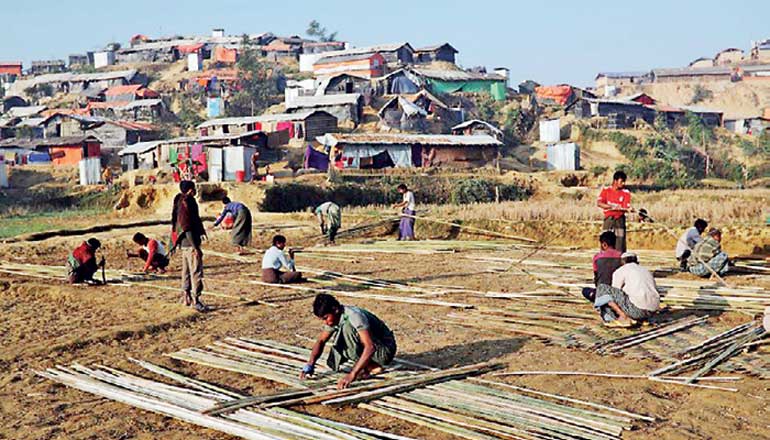Saturday Feb 21, 2026
Saturday Feb 21, 2026
Wednesday, 24 January 2018 00:11 - - {{hitsCtrl.values.hits}}
 Palong Khali, Bangladesh/Naypyitaw, Myanmar (Reuters): The UN refugee agency and other groups have urged a rethink of the plan to send Rohingya refugees back to Myanmar amid fears of forced repatriations and the inability of aid agencies to ensure the safety of hundreds of thousands who fled bloodshed at home.
Palong Khali, Bangladesh/Naypyitaw, Myanmar (Reuters): The UN refugee agency and other groups have urged a rethink of the plan to send Rohingya refugees back to Myanmar amid fears of forced repatriations and the inability of aid agencies to ensure the safety of hundreds of thousands who fled bloodshed at home.
The calls come as Bangladesh delayed the repatriation of the largely stateless Rohingya to Myanmar as the process of compiling and verifying the list of people to be sent back was incomplete.
“In order for the repatriation to be (done) right, to be sustainable, actually viable ... you need to really address a number of issues that for the time being we have heard nothing about,” UNHCR head Filippo Grandi said in Geneva, noting that issues like citizenship had not been addressed.
More than 688,000 Muslim Rohingya and a few hundred Hindu Rohingya have fled to Bangladesh since 25 August last year after the Myanmar military cracked down in the northern part of Rakhine state, amid witness reports of killings, looting and rape, in response to militant attacks on security forces.
Many in Buddhist-majority Myanmar regard the largely Muslim Rohingya community as illegal immigrants from Bangladesh. The United Nations described Myanmar’s crackdown as ethnic cleansing of the Rohingya, which Myanmar denies.
Grandi said it was important to set in place a monitoring mechanism in Rakhine for those returning and noted the UNHCR currently did not have the ability to move freely and perform this role there.
Myanmar and Bangladesh agreed earlier this month to complete a voluntary repatriation of the refugees in two years. Myanmar says it had set up two reception centres and a temporary camp near the border in Rakhine to receive the first arrivals.
Human Rights Watch, a non-government organization, said on Tuesday that Bangladesh should suspend the plan entirely as it “threatens the refugees’ security and wellbeing”.
The plan has sparked fears in refugee camps in Bangladesh that people may be forced to return despite a lack of guarantees around their security.